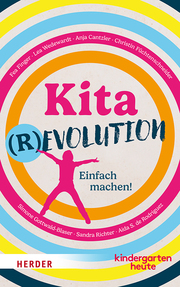Beschreibung
This book explores international perspectives on quality improvement within the field of early childhood education and care. Many countries and governments are focusing on preschool quality as a way to improve entrenched inequalities and reduce social disadvantage and segregation: this book draws together various global case studies to showcase how different countries tackle aspects of quality improvement. The concept of quality is understood in different ways both culturally and contextually, and the implementation of measures to improve quality will differ from country to country. The book draws together case studies from numerous contexts to showcase various ways of working with aspects of quality improvement. Sharing important insights into policy and practice, this book guides a shared understanding of the complex nature of quality improvement within early childhood education and care.
Autorenportrait
Susanne Garvis is Professor and Chair of the Department of Education, Swinburne University of Technology, Australia. She is a mixed methods researcher within early childhood education and works within early childhood teacher education and policy development around quality improvement.
Hillevi Lenz Taguchi is Professor of Child and Youth Studies and Early Childhood Education, Stockholm University, Sweden. She focuses on praxis-oriented and action research, and has recent experience of leading the first intervention randomized control trial in Swedish preschool using brain-imaging data.
Inhalt
Introduction: International Perspectives on Quality Improvement in Early Childhood Education; Susanne Garvis& Hillevi Lenz Taguchi.- 1. Improving the Quality of Early Childhood Education and Care in Oman; Ali Kemal Tekin, Laila Al Salmi& Ibrahim Qaryouti.- 2. Enhancing quality for infants and toddlers through effective teaching practices: A New Zealand perspectiv; Karyn Aspden.- 3. Quality in ECE in Iran: what the concept "quality" mean and how it is being assessed, reported and improved; Ebrahim Talaee.- 4. Perspectives on Quality in ECEC - A content Analysis on First Year Teacher Students Views in Finland; Marina Lundkvist& Heidi Harju-Luukkainen.- 5. Developmental work (Norwegian Utviklingsarbeid) as student driven quality improvements in ECEC settings; Alicja R. Sadownik.- 6. Quality monitoring in daycare centers discourses, concepts and experiences in German early childhood education and care; Stefan Faas& Sabine Dahlheimer.- 7. Development of preschool teachers competences as a way to increase the ECE quality in Russia; Igor Shiyan, Olga Shiyan& Tatiana Le-van.- 8. Quantity vs. Quality Improvement in Early Childhood Education and Care in The Context of Turkey; Belkis Tekman.- 9.Continuous Improvement in Early Childhood Pedagogical Practice The Victorian Advancing Early Learning (VAEL) Study in Australia; Patricia Eadie& Jane Page.- 10. Neuroscientific approaches to optimize self-regulatory skills in children from backgrounds of poverty in different cultural contexts in Argentina and the United States; Sebastián Lipina& Eric Pakulak.- 11. Quality improvement in Sweden; Susanne Garvis, Pia Williams& Sonja Sheridan.- 12. Evaluating quality in Finnish early childhood education; Johanna Heikka& Elina Fonsen Quality assessment and challenge of preschool education in China; Yan ZhangConclusion: What can we learn looking across the countries?
E-Book Informationen
„eBooks“ sind digitale Bücher. Um eBooks lesen zu können, wird entweder eine spezielle Software für Computer, Tablets und Smartphones oder ein eBook-Reader benötigt. Da es eBooks in unterschieldichen Formaten gibt, gilt es, folgendes zu beachten.
Von uns werden digitale Bücher in drei Formaten ausgeliefert. Die Formate sind EPUB mit DRM (Digital Rights Management), EPUB ohne DRM und PDF. Bei den Formaten PDF und EPUB ohne DRM müssen Sie lediglich prüfen, ob Ihr eBook-Reader kompatibel ist. Wenn ein Format mit DRM genutzt wird, besteht zusätzlich die Notwendigkeit, dass Sie einen kostenlosen Adobe® Digital Editions Account besitzen. Wenn Sie ein eBook, das Adobe® Digital Editions benötigt, herunterladen, erhalten Sie eine ASCM-Datei, die zu Digital Editions hinzugefügt und mit Ihrem Account verknüpft werden muss. Einige eBook-Reader (zum Beispiel PocketBook Touch) unterstützen auch das direkte Eingeben der Login-Daten des Adobe Accounts – somit können diese ASCM-Dateien direkt auf das betreffende Gerät kopiert werden.
Da eBooks nur für eine begrenzte Zeit – in der Regel 6 Monate – herunterladbar sind, sollten Sie stets eine Sicherheitskopie auf einem Dauerspeicher (Festplatte, USB-Stick oder CD) anlegen. Außerdem ist die Anzahl der Downloads auf maximal 5 begrenzt.








